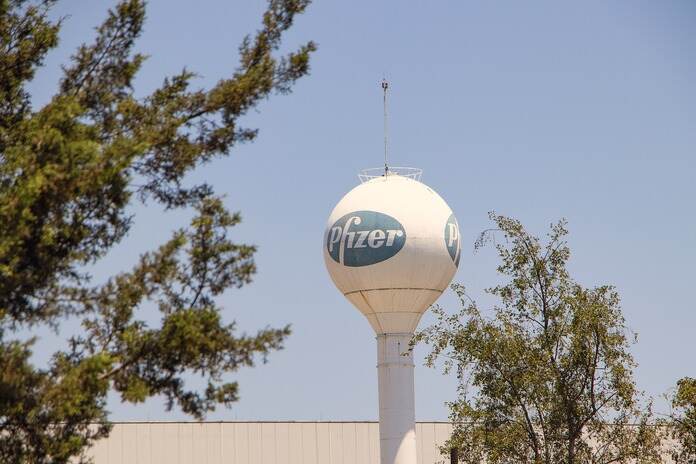Pfizer Stock Price Forecast
Rival pharmaceutical companies are commencing what is expected to be one of the bloodiest confrontations in the market as they attempt to challenge Pfizer Inc.’s hegemony over the $7 billion global market for pneumonia vaccines.
Merck & Co. has already launched a new rival to Pfizer’s Prevnar vaccine line, and businesses like GSK PLC and Vaxcyte Inc. are also working on vaccines that aim to increase sales by providing protection against more strains of the pneumococcal virus.
The businesses are vying for a slice of the lucrative market that Pfizer has controlled for more than a decade and which Wall Street analysts predict could exceed $10 billion annually by 2028.
Louise Chen, an analyst at Cantor Fitzgerald & Co., described the situation as “kind of an all-out war to see who can obtain this $10 billion that’s out there on the table.”
After Covid-19 shots generated tens of billions of dollars in sales for Pfizer (NYSE:PFE) and Moderna Inc., the race is a further indication of the pharmaceutical industry’s rekindled interest in vaccines.
For a variety of viral diseases, including the respiratory syncytial virus, businesses are already developing vaccines. To enhance flu and other vaccinations, some are also experimenting with messenger RNA or other cutting-edge technologies.
Since entering the market in 2010 with its $68 billion acquisition of Wyeth and its flagship product Prevnar, Pfizer has dominated pneumonia, or pneumococcal, vaccination market.
Before the pandemic struck, Prevnar was Pfizer’s best-selling medicine for a number of years, and sales of the Covid-19 vaccine, which the company co-developed with BioNTech SE, led the industry. Prevnar achieved $5.3 billion in sales last year.
According to Annaliesa Anderson, who oversees the organization’s vaccine research and development, the company’s extensive experience with pneumonia vaccines, production capabilities, and connections with pediatricians should also aid in its ability to retain leadership. She declared, “We’re in an excellent situation.
Streptococcus pneumonia, a family of bacteria that causes illnesses like meningitis, pneumonia, and sepsis, is protected by pneumococcal immunizations. The shots take aim at numerous strains in order to provide the best defense.
According to the Centers for Disease Control and Prevention, pneumococcal pneumonia causes around 150,000 hospital admissions each year in the United States, while pneumococcal meningitis and bacteremia claim the lives of about 3,250 people.
According to Azra Behlim, associate vice president of pharmacy sourcing and program services at Vizient Inc., a group purchasing organization, the number of pneumococcal vaccine doses administered in the U.S. increased 12% from a year ago as a result of rising disease awareness and an increase in the number of retail pharmacies offering shots.
Over time, vaccines become less effective and new strains appear, which forces manufacturers to create new injections.
After selling Prevnar formulations that targeted seven, then 13 strains, Pfizer received approval from the Food and Drug Administration last year to market Prevnar-20, an upgraded shot that covers 20 strains. Prevnar-13 from the business, which covers 13 strains, is suitable for young people.
A longtime vaccine manufacturer, Merck, released Vaxneuvance for adults last year. It offers defense against 15 types, including the two that Prevnar-13 also targets. Merck released Vaxneuvance for kids this summer.
The CDC recommends pneumococcal vaccination for individuals aged 65 and older, as well as for persons aged 19 to 64 with specific medical conditions or risk factors. The organization also suggests vaccination for kids under 5 and for kids aged 5 to 18 who have health issues that increase their risk of illness.
The organization opposes the use of any particular firearm on either adults or children. However, it advises individuals receiving Vaxneuvance to follow up a year later with Pneumovax 23, a Merck booster.
Since the introduction of Vaxneuvance, experts and physicians claim that the ease of a single shot has helped Pfizer maintain its lead over Merck.
Ryan Mire, MD, president of the American College of Physicians, said, “It’s extremely simple for me to tell my patient, this is the only vaccine you need for pneumonia and you’re done.”
According to Raymond Brown, a senior pharmacist at consulting firm Mercer LLC, the Prevnar franchise has been responsible for approximately 90% of the shots given at medical offices, clinics, and hospitals, with Prevnar-20 accounting for 15% to 20%. Together, Merck’s two vaccines account for less than 10%.
A different vaccine developed by Merck is also undergoing an early-stage investigation. This vaccination is intended to combat strains that primarily affect youngsters.
Pfizer is creating a pediatric version of Prevnar-20 in an effort to counter Merck’s pediatric initiatives. The business announced that it would submit an FDA approval application this year.
Pneumococcal vaccines being developed by GSK and Vaxcyte would provide protection against 24 strains, which is greater than Pfizer or Merck’s vaccines.
Featured Image- Pixabay @ mike_ramirez_mx















